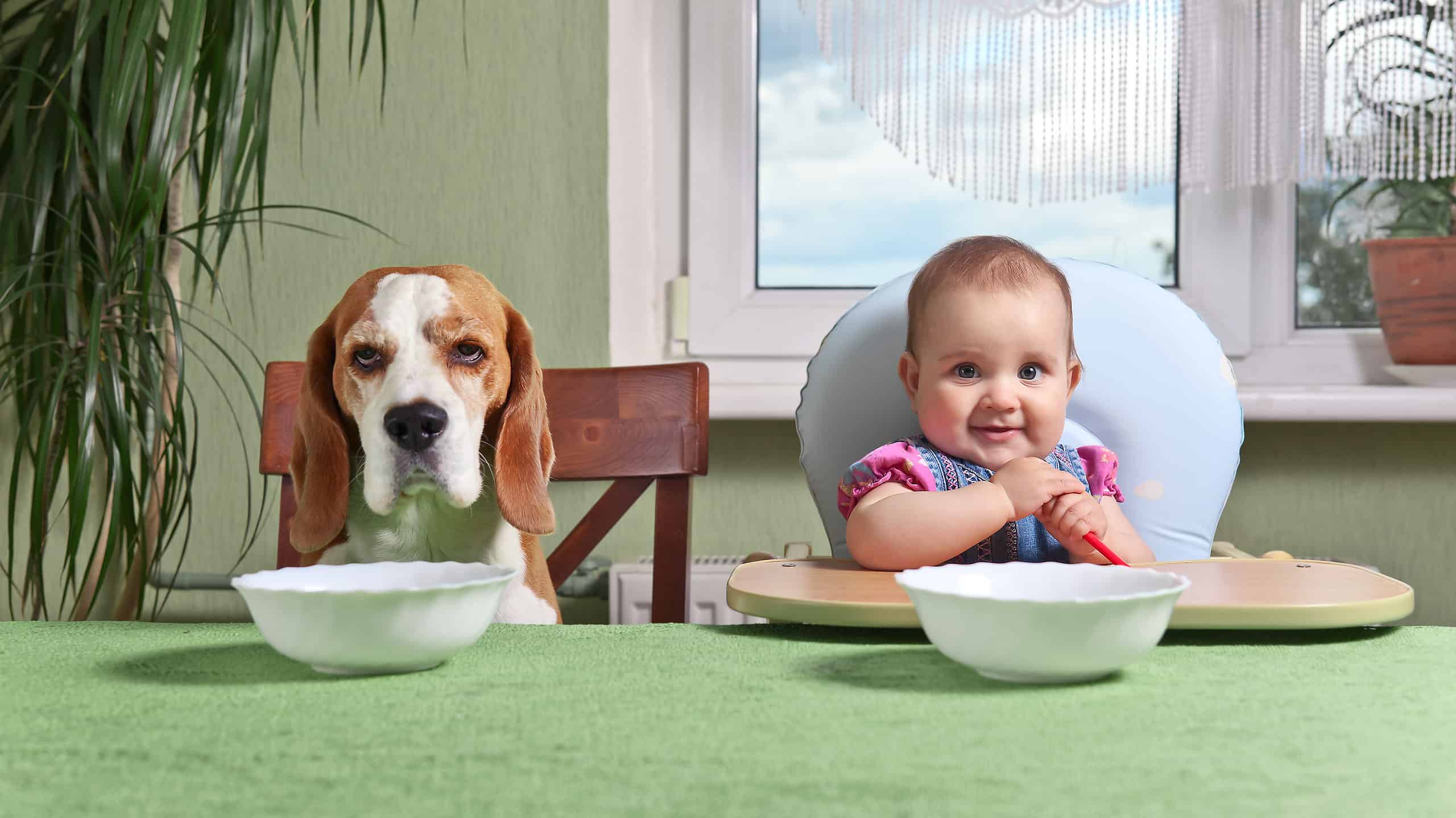Baby food feels like it must be the safest food in the world. If it’s safe for babies, then surely, it’s safe for everyone including Fido? Not quite! Baby food is safe for baby humans, but it’s not necessarily safe for animals. Let’s take a closer look to uncover whether dogs can eat baby food safely or if it’s toxic.
Is Baby Food Good for Dogs?
Dogs can eat baby food if it doesn’t include any dog-toxic ingredients, but that doesn’t mean they should eat it.
Feeding your dog a little bit of safe baby food (we’ll get into what that is a bit later) is OK now and then as a treat, but dogs should eat complete dog food as their main source of calories and nutrients.
Humans and dogs have different bodies and therefore they need different fuel. For example, grapes are toxic for dogs, but babies can eat mashed grapes and they’re a common ingredient in baby food.
That said, there are times when baby food is handy. Let’s say your dog is unwell and needs encouragement to eat or they are old and have a poor appetite. A spoonful of dog-safe baby food can kick-start their excitement over a meal.
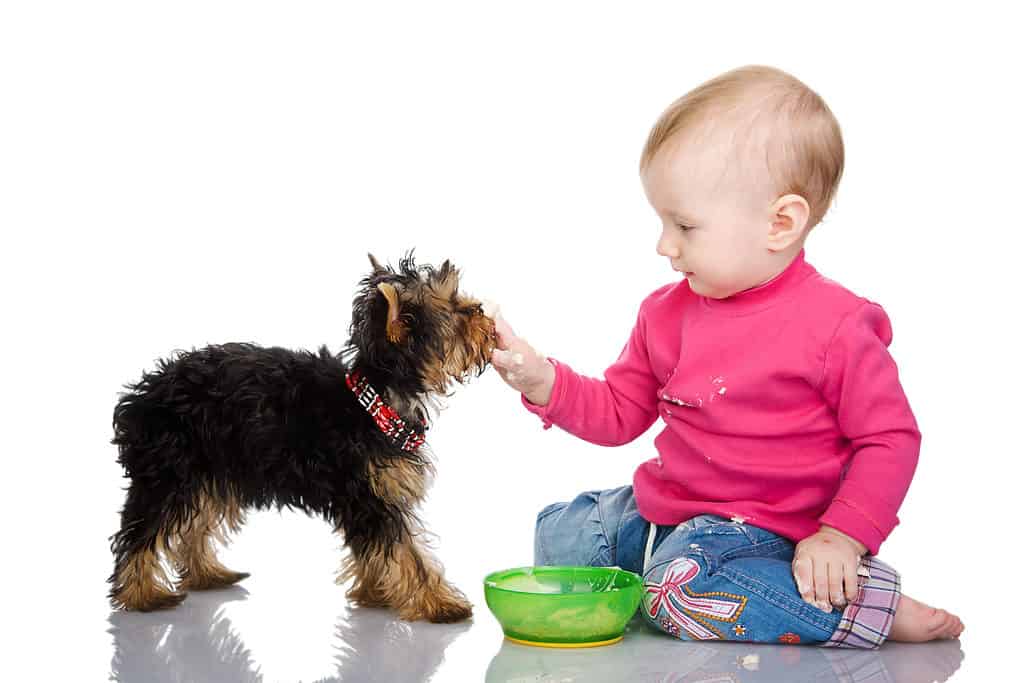
Dogs can
eat baby food if it doesn’t include any dog-toxic ingredients, but that doesn’t mean they should eat it.
©iStock.com/photodeti
What is Baby Food?
Baby food is any type of human food that’s soft and easily eaten because babies don’t have teeth to chew and soft foods that are easy to digest.
Homemade baby foods are usually cooked, mashed or pureed fruit, veg or meat and the same goes for commercial baby food. The difference is commercial baby food is ready to go straight from the packet without any effort on your part.
Commercial baby food started appearing in the United States in the 1920s made by Clapp’s Baby Food company. It wasn’t until the 1980s that Heinz made the first dehydrated baby food.
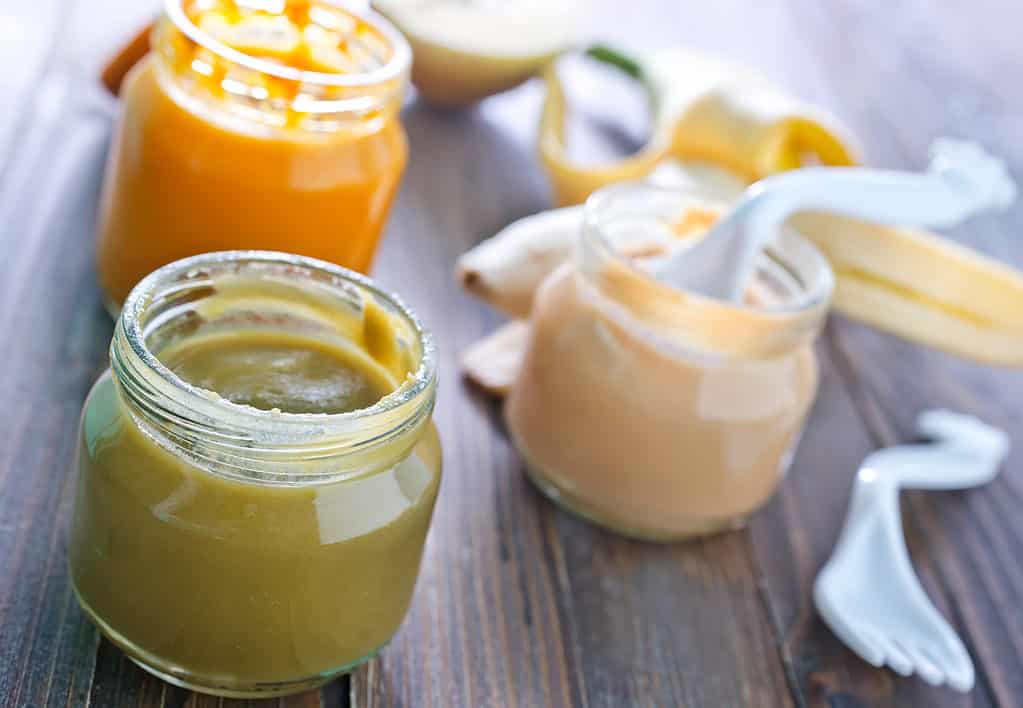
Baby food is human food that’s soft and easily eaten with nutrients that babies need for healthy growth and development.
©Gayvoronskaya_Yana/Shutterstock.com
Health Benefits of Baby Food
Baby food has lots of health benefits because it’s made for growing babies that need all the nutrients they can get. It’s well monitored and regulated by the authorities too.
Let’s start by looking at it’s nutrient content.
Fruits, veggies, and meat
Baby food contains a wide array of ingredients including plenty of meat, fruit and veggies. This means it has lots of nutrition which is also great for dog health such as:
- Vitamin A – boosts eye health
- Vitamin B – converts red blood cells to produce lots of energy
- Vitamin C – for a kick-ass immune system
- Vitamin D – supports bone health and may play a role fighting depression
- Vitamin K – essential for rapid blood clotting
- Calcium – supports strong bones, teeth and nails
- Iron – the building base of red blood cells and energy levels
- Protein – essential for strong muscles and connective tissues
- Zinc – helps repair cells, builds DNA and protein
There’s also a good level of fiber in there due to the amount of fruit and veg. Fiber is important for dogs because it keeps their bowels regular and fights off digestive disease.
However, commercial baby food is often sterilized and cooked at high temperatures to kill any lurking bacteria and this destroys some of the nutrients.
It’s easy to eat
By virtue of babies having no (or very few) teeth, baby food is mushy, sloppy and soft, so it could be a good choice for dogs with dental problems. It’s also very easy to digest and sometimes recommended by vets for dogs with digestive distress.
Low in salt and sugar
Baby food is very low in salt and sugar, so if your dog is unwell, and they are overweight or prone to pancreatitis, baby food could help plug a temporary diet gap.
Hide medications
Some dogs are excellent at taking medicines, they just gulp it down no problem, but there are pooches that are, let’s say, a little more difficult!
Baby food is smelly (in a good way) especially the meat-filled types, so it does a great job of covering up the scent and taste of medications, including liquid forms. Top tip, it works for children and older folk too.
The Risks of Baby Food
Baby food seems harmless, and it is for babies, but not all baby food is good for dogs. Here’s why:
Dog toxic ingredients
Dogs cannot eat certain foods because they are toxic. In some situations dogs have died after eating them, so it’s really important to read the ingredient label. Here are some of the ingredients dogs can’t have.
Grapes – dogs can’t metabolize grapes and it can lead to kidney failure (that’s sultanas and raisins too)
Chocolate – baby food desserts with chocolate are bad news for dogs who can’t digest the compounds. Again, this can lead to fatalities
Xylitol – not often included in baby food, but worth watching out for is the artificial sweetener xylitol that’s more than capable of causing a fatal drop in blood sugar. Dogs have died from eating xylitol-filled chewing gum and skinny ice cream
Onions – tasty onions pop up regularly in baby food but they cause anemia in dogs
Garlic – the same goes for garlic, it binds to red blood cells and also causes anemia
Other toxic ingredients that are not often found in baby food are macadamia nuts, nutmeg, bleu cheeses, and black walnuts. Alcohol is off the drinks menu.
It can lead to obesity
A few spoonfuls of non-toxic baby food won’t hurt your dog on occasion, but if this is a regular habit it can pack pounds on Rover’s waistline.
56% of dogs in the United States are over or obese according to the Association for Pet Obesity Prevention. Being overweight makes diseases like cancer and diabetes more likely plus it puts too much strain on their joints so it’s worth making sure your dog is a healthy weight for its breed, and keep snacks like baby food to a minimum.
How Much Baby Food Can a Dog Have?
The ASPCA recommend treat food is limited to 10% of a dog’s daily intake and the rest of their nutrients from complete dog food. In small breeds that can be just a tablespoon.
Baby food isn’t a long-dated product, and many are labelled as “discard 24 hours after opening”. This can mean you fall foul of giving your dog lots of baby food to avoid wastage. Try freezing what’s left in an ice-cube tray and adding one to their meal now and then.
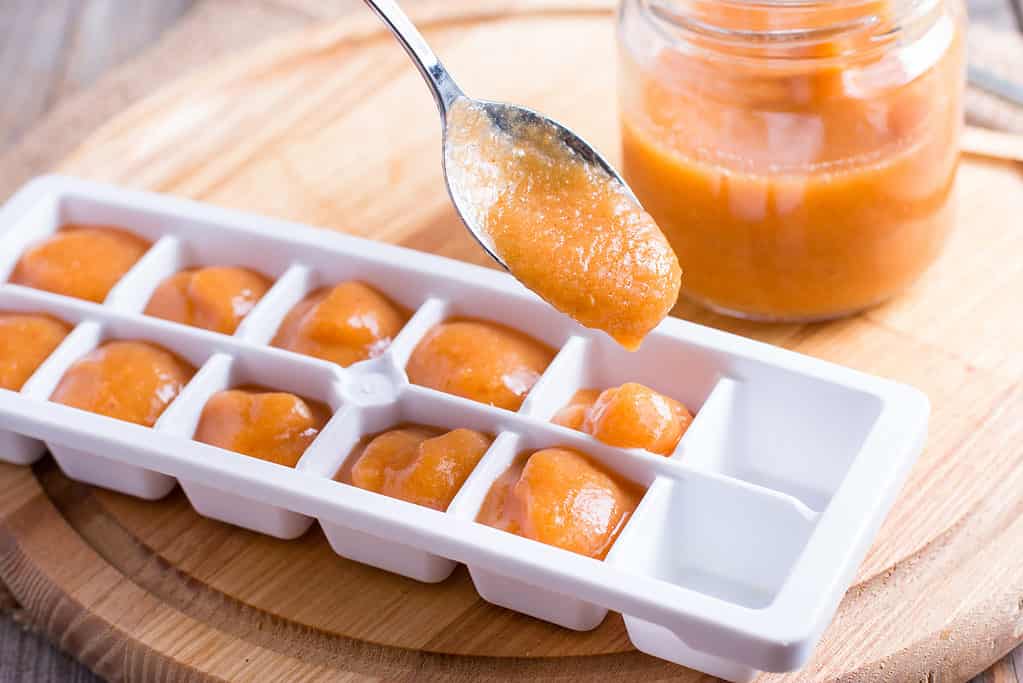
Baby food can be frozen in ice cube trays preserving the food longer and making it easy to add to your dog’s meal or to use as a treat.
©iStock.com/Qwart
Can a Sick Dog Eat Baby Food?
Sick dogs can benefit from baby food, so long as it doesn’t contain any toxic ingredients.
It’s always best to consult a vet for advice on a sick dog, but some do recommend baby food for underweight pups, gastric upsets, and elderly dogs.
If your pooch has a stomach upset baby food can help settle it because the ingredients are easy to digest, but it’s not a long-term fix. Any gastric episode lasting for a few days needs veterinary advice because it can lead to dehydration or be a symptom of a more serious underlying problem.
My Dog Ate Baby Food What Should I Do?
It depends.
If the baby food was free from toxic ingredients then the chances are your pup will be just fine. A stomach upset might occur, so keep an eye on them.
However, if the baby food included a toxic ingredient like xylitol, grapes, chocolate, onion, or garlic then consult a vet straight away. Make a note of the ingredients, how much they ate, and if possible, your dog’s approximate weight.
How Do I Give My Dog Baby Food?
There are several ways!
The first is adding a spoonful to your dog’s main meal as a treat or for extra nutrients. Some people like to warm it up first, which makes it extra stinky to disguise medication or stimulate a poor appetite.
Another way is “lick the spoon” what dog doesn’t enjoy this? It’s a great way to bond with your dog, just make sure they don’t damage their mouth grabbing the spoon. Never offer your dog food on a fork or knife for this reason.
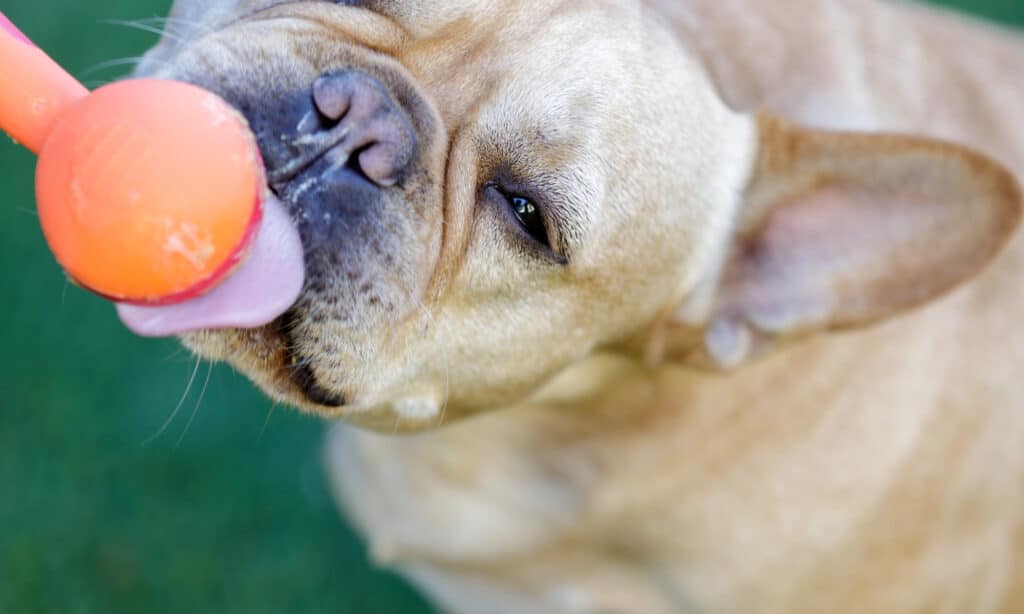
You can give your dog some baby food on a spoon and let them lick it off.
©yhelfman/Shutterstock.com
Is Baby Food OK for Dogs?
Baby food is OK for dogs if it doesn’t include toxic ingredients and it’s given infrequently as a treat. A dog’s main source of nutrients should always be good quality complete dog food.
Up Next
Ready to discover the top 10 cutest dog breeds in the entire world?
How about the fastest dogs, the largest dogs and those that are -- quite frankly -- just the kindest dogs on the planet? Each day, AZ Animals sends out lists just like this to our thousands of email subscribers. And the best part? It's FREE. Join today by entering your email below.
Thank you for reading! Have some feedback for us? Contact the AZ Animals editorial team.

